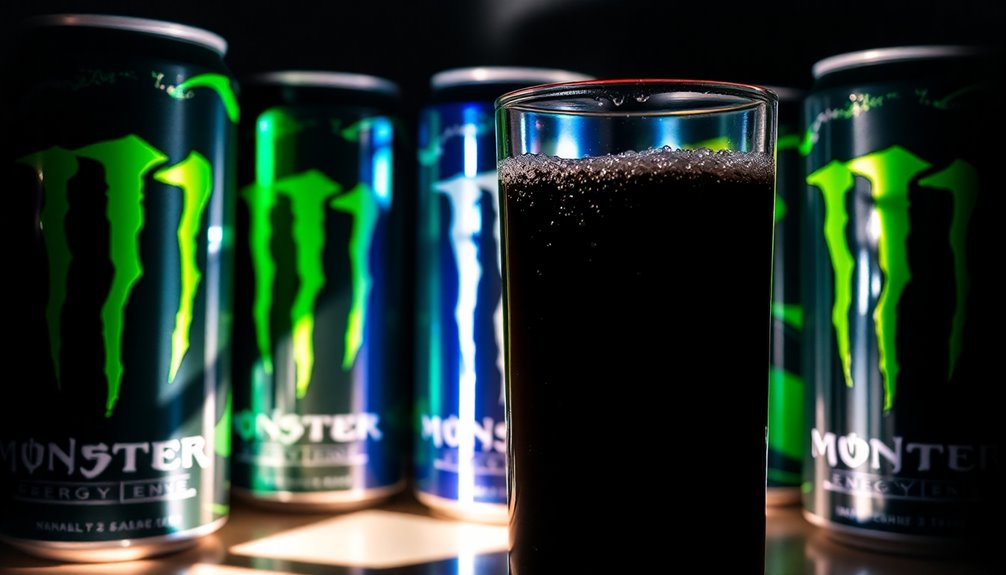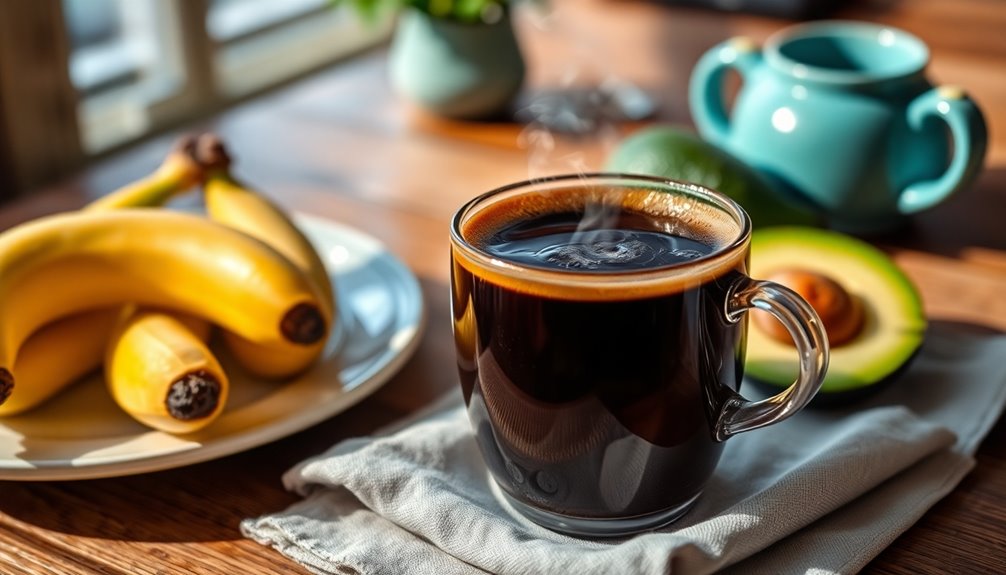You might be surprised to learn that Pepsi packs a decent caffeine kick. Regular Pepsi contains about 38 mg of caffeine per 12-ounce can, while Diet Pepsi has around 35-37 mg. If you're comparing, that's less than a cup of coffee, which has about 95 mg. However, Pepsi Zero takes it up a notch with around 69 mg. Always remember that caffeine can vary between different drinks, and the synthetic source in sodas differs from natural sources like coffee. If you want to uncover more fascinating details about Pepsi's caffeine landscape, keep exploring further!
Key Takeaways
- Diet Pepsi has 35-36.7 mg of caffeine per 12 fl oz, while regular Pepsi contains 38-38.9 mg.
- Diet Coke has a higher caffeine level at approximately 46 mg per 12 fl oz.
- Pepsi Zero contains significantly more caffeine at 69 mg per 12 fl oz, appealing to energy-seeking consumers.
- Pepsi Café combines soda and coffee, offering 100 mg of caffeine per serving, reflecting consumer preferences for functional beverages.
- The FDA allows up to 71 mg of caffeine per 12 fl oz in soft drinks without special labeling, promoting transparency in caffeine content.
Caffeine Content in Diet Pepsi

When you reach for a Diet Pepsi, you can expect a moderate caffeine kick. With approximately 35-36.7 mg of caffeine per 12 fl oz serving, it provides a decent boost without overwhelming your system.
This caffeine content in your favorite soda is lower than what you'll find in Diet Coke, which packs about 46 mg per the same serving size. Curiously, Diet Pepsi's caffeine is slightly less than regular Pepsi, which has around 38-38.9 mg.
Keep in mind that the caffeine in Diet Pepsi is synthetic, unlike the natural caffeine found in coffee and tea. So, if you're looking for a lower-calorie option that still delivers a caffeine lift, Diet Pepsi fits the bill nicely.
Health Impacts of Caffeine
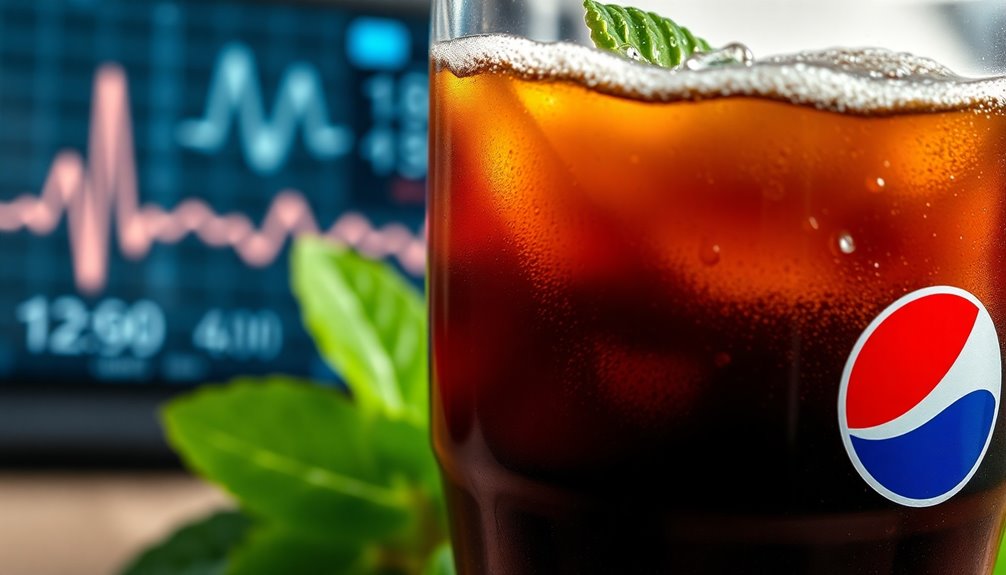
When you enjoy a Diet Pepsi, you're getting a caffeine boost that can enhance your alertness and help you fight fatigue.
However, keep in mind that your sensitivity to caffeine can vary; what works for one person mightn't work for you.
It's important to monitor how your body reacts, especially if you consume caffeine regularly.
Moderate Consumption Benefits
Caffeine can offer several benefits when consumed in moderation, making it a popular choice among many adults. Moderate consumption benefits include enhanced alertness and reduced fatigue, and you might find that a soda like Diet Pepsi fits nicely into your daily routine. Here's a quick look at the benefits of moderate caffeine intake:
| Benefit | Description |
|---|---|
| Improved Alertness | Increases focus and mental clarity. |
| Reduced Fatigue | Helps combat feelings of tiredness. |
| Enhanced Mood | Can elevate your overall mood and well-being. |
| Cognitive Function | Supports better decision-making and memory. |
Aim for 200-400 mg per day for best effects, but always listen to your body and adjust your intake based on your personal tolerance. Additionally, maintaining high vibrational energy can further enhance the benefits of caffeine consumption.
Caffeine Sensitivity Variations
Not everyone enjoys the same experience with caffeine, as sensitivity can differ considerably from person to person. About 10% of people are classified as caffeine sensitive, feeling adverse effects like anxiety or insomnia from even small doses.
While the general recommendation for moderate caffeine consumption is 200-400 mg daily, you might need to limit your intake to under 100 mg if you find yourself sensitive.
Synthetic sources, such as Diet Pepsi, can trigger reactions more intensely than natural sources. If you're sensitive, watch out for high doses of aspartame, which can worsen digestive issues and amplify caffeine's effects.
Being mindful of these factors can help you manage your caffeine sensitivity effectively. Additionally, it's important to note that cold medications can interact with caffeine, potentially leading to increased side effects.
Comparing Caffeine Levels
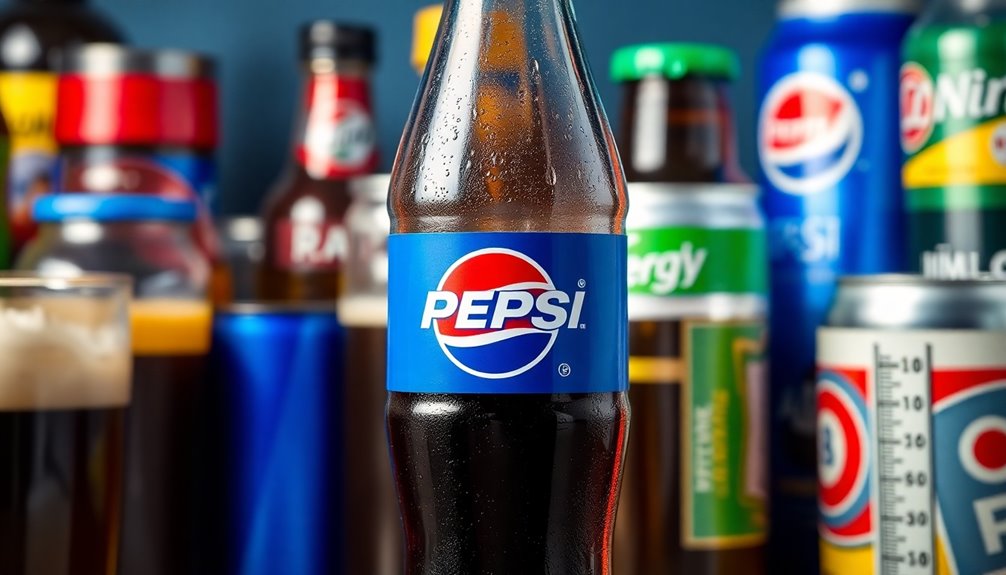
While many people reach for soda for a revitalizing boost, the caffeine levels can vary considerably between brands and types. If you're curious about the caffeine content in your favorite sodas, here's a quick comparison:
| Soda Type | Caffeine (mg per 12 fl oz) | Notes |
|---|---|---|
| Diet Pepsi | 35-36.7 | Lower than regular Pepsi |
| Regular Pepsi | 38-38.9 | Classic cola option |
| Diet Coke | 46 | Higher caffeine option |
| Pepsi Zero | 69 | Stronger caffeine boost |
| Sunkist | 41 | Surprising citrus option |
Notably, a standard cup of coffee contains about 95 mg of caffeine per 8 oz, so sodas generally provide less caffeine than your morning brew.
Consumer Trends and Preferences

As consumers become more health-conscious, their beverage choices reflect a growing preference for low-calorie and sugar-free options.
You might notice that Diet Pepsi is gaining popularity among those seeking a caffeine boost without the extra calories. With approximately 35-36.7 mg of caffeine per 12 fl oz serving, it offers a satisfying alternative to regular sodas, which often pack over 40g of sugar.
The shift toward healthier living has led many to explore products with lower caffeine and calorie content. As awareness of health impacts rises, consumer trends and preferences are shifting toward beverages that not only taste good but also provide functional benefits, like those found in the expanding market for caffeine-infused drinks. Additionally, studies have shown that caffeine can enhance athletic performance, making it a popular choice among fitness enthusiasts.
Regulatory Standards for Caffeine
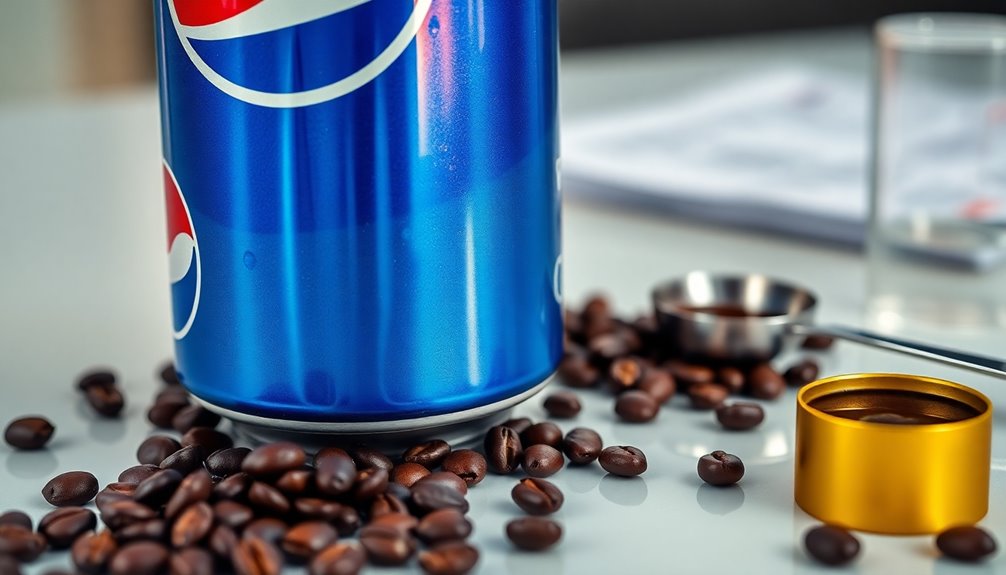
Given the increasing popularity of caffeinated beverages, regulatory standards for caffeine play an essential role in ensuring consumer safety and informed choices.
The FDA regulates caffeine as a food additive in soft drinks, allowing up to 71 mg per 12 fl oz without special labeling. This means you can easily find the caffeine content on packaging, promoting transparency about what you're consuming.
Regulatory bodies actively monitor caffeine levels in drinks to prevent excessive intake and safeguard your health. Standard serving sizes also help you compare caffeine content across different products effectively.
Understanding Caffeine Sources
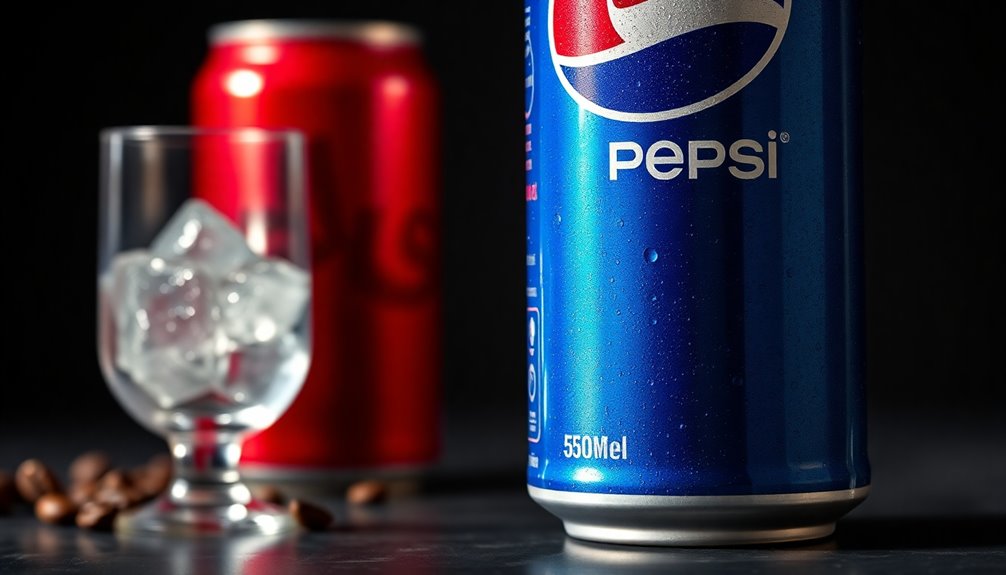
When you think about caffeine sources, it's important to recognize the difference between synthetic and natural options.
While Diet Pepsi contains synthetic caffeine that adds a unique flavor profile, beverages like coffee and tea offer natural caffeine derived from plants.
Understanding these sources can help you make better choices for your health and taste preferences.
Synthetic vs. Natural Sources
What's the difference between synthetic and natural caffeine sources? The caffeine in Diet Pepsi is synthetic, unlike the natural caffeine in coffee and tea, which comes from beans and leaves. While natural sources offer health benefits, synthetic caffeine mainly enhances flavor and balances sweetness. Diet Pepsi contains about 35-36.7 mg of caffeine per 12 fl oz, considerably less than the average 95 mg in an 8 oz coffee.
| Caffeine Source | Type | Health Benefits |
|---|---|---|
| Coffee | Natural | Antioxidants, energy boost |
| Tea | Natural | Hydration, calming effects |
| Diet Pepsi | Synthetic | Flavor enhancement |
Understanding these differences can help you make informed choices about your caffeine intake.
Caffeine's Taste Profile
Caffeine's taste profile varies considerably between natural and synthetic sources, impacting how you experience beverages.
Natural caffeine, found in coffee beans, tea leaves, kola nuts, and cocoa beans, brings a slightly bitter taste that enhances the flavors of drinks like coffee and tea.
In contrast, Diet Pepsi uses synthetic caffeine, which alters its overall taste experience. Although it contains about 2.9 mg of caffeine per fluid ounce, the synthetic source means it lacks the same depth of flavor found in naturally caffeinated drinks.
Here, caffeine not only acts as a stimulant but also balances the sweetness of artificial sweeteners like aspartame.
Health Implications of Sources
While many people enjoy Diet Pepsi for its crisp taste and low calorie count, understanding the health implications of its synthetic caffeine source is essential. Many people may not be aware that Diet Pepsi contains a synthetic caffeine source, which can have different effects on the body compared to natural caffeine. In fact, studies have shown that the surprising caffeine levels in Pepsi can be higher than in other popular sodas. It’s important for consumers to consider the potential impact of synthetic caffeine on their health and make informed choices about their beverage consumption.
The caffeine content in your favorite soda is about 35-36.7 mg per 12 fl oz, which is moderate compared to coffee and energy drinks. However, since it's synthesized rather than natural, it may not offer the same perceived health benefits as caffeine from coffee beans or tea leaves.
Regular consumption can lead to negative effects like anxiety or insomnia, especially if you're sensitive. Plus, with aspartame included, some debate its safety and potential digestive issues.
Being aware of these factors can help you make informed choices about your caffeine consumption.
Caffeine Content Labeling Practices
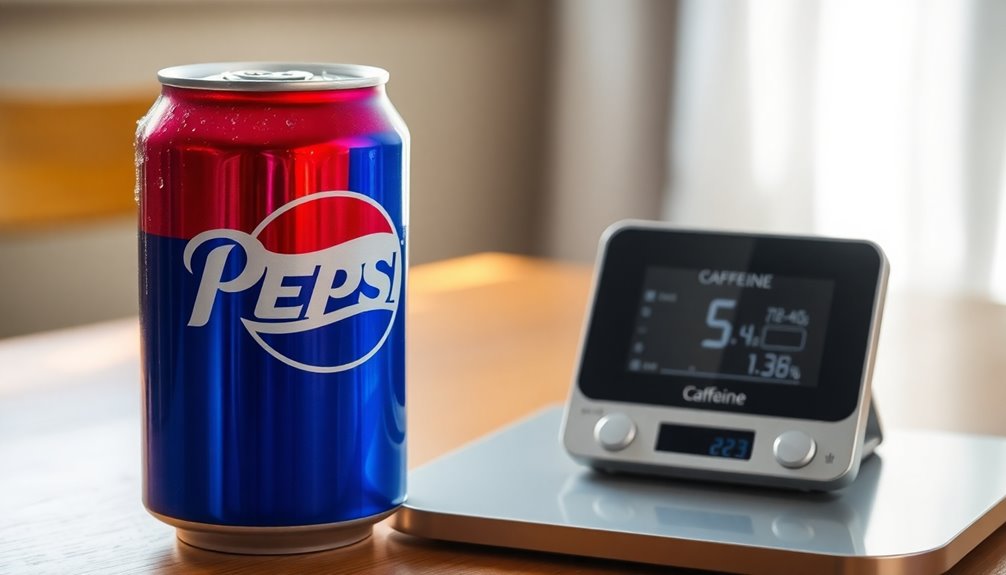
As consumers become more health-conscious, understanding caffeine content in beverages like Pepsi has never been more important.
Caffeine content labeling practices play a key role in helping you manage your intake. While the FDA allows soft drinks to contain up to 71 mg of caffeine per 12 fl oz without special labeling, many brands, including Pepsi, voluntarily disclose caffeine amounts on their packaging.
This transparency includes caffeine from all sources, ensuring you have a complete picture of what you're consuming. Standard serving sizes on labels also make it easier for you to compare caffeine levels across different beverages.
Increased awareness and demand for clarity have pushed brands to adopt these practices, giving you essential information for informed choices.
Surprising Caffeine Insights
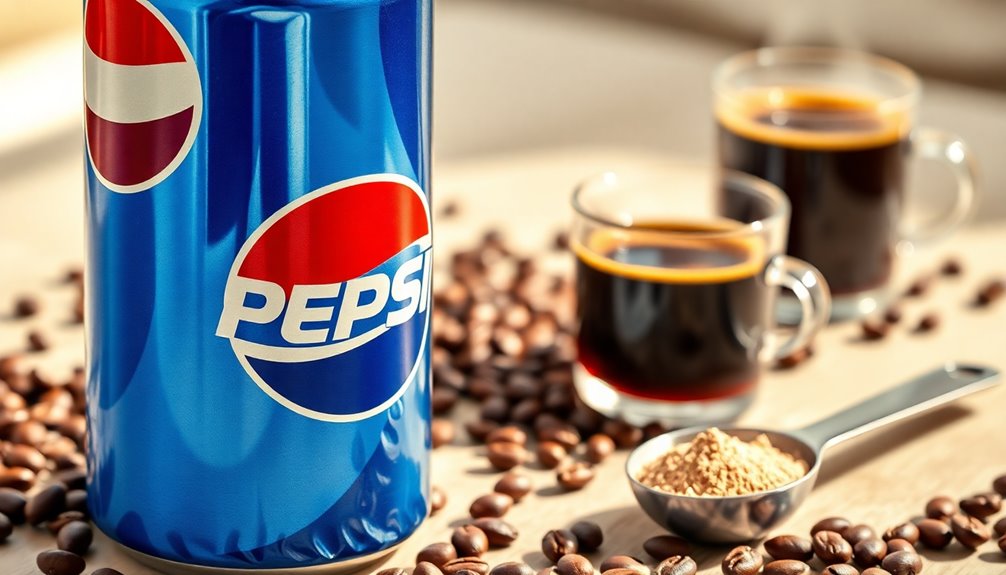
Understanding caffeine content goes beyond just knowing the numbers; some surprising insights might change how you view your favorite beverages.
For instance, did you know that Diet Pepsi contains around 35-36.7 mg of caffeine per 12 fl oz? That's moderate, but it's still lower than Diet Coke, which has about 46 mg.
You might also be surprised to learn that citrus sodas like Sunkist can pack a punch with 41 mg per 12 oz, defying the idea that color correlates with caffeine levels.
Plus, the caffeine content in your favorite soft drinks can vary by production batch and location, leading to inconsistencies.
Future of Caffeinated Beverages
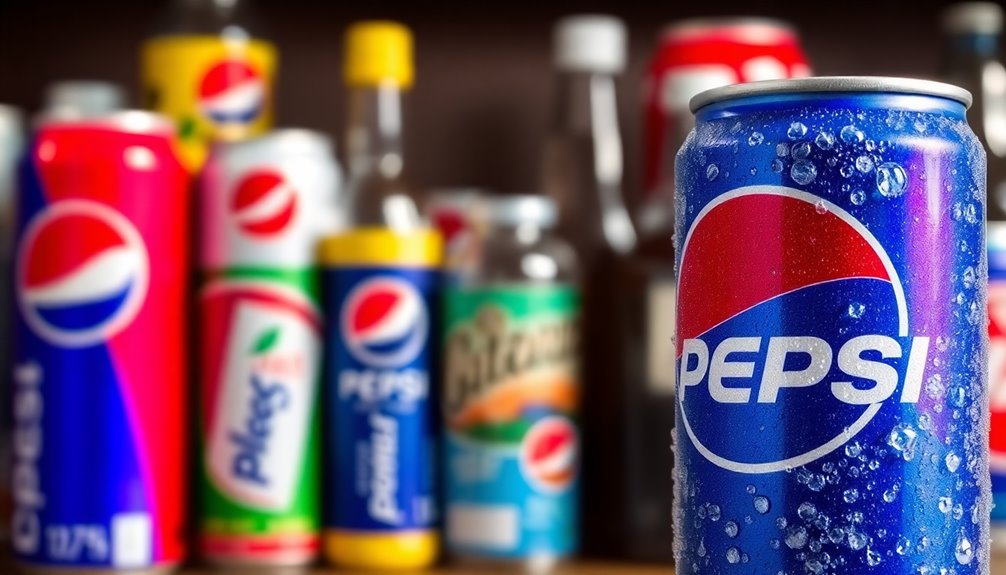
The future of caffeinated beverages looks promising as consumers shift their preferences toward drinks that offer both energy and nutritional benefits. Brands are innovating to meet this demand, blending traditional soda flavors with coffee, like PepsiCo's Pepsi Café. This trend reflects a desire for functional drinks over sugary options. As you consider your choices, transparency in labeling will play a key role. Expect clearer information about caffeine content, helping you make informed decisions. Additionally, understanding the AI's transformative role in food and beverage production can shape how companies develop new products to meet consumer needs.
| Beverage | Caffeine Content (mg) | Nutritional Benefits |
|---|---|---|
| Pepsi Café | 100 | Coffee-derived antioxidants |
| Energy Drink | 150 | Vitamins B and electrolytes |
| Iced Green Tea | 30 | Antioxidants and hydration |
Frequently Asked Questions
Is Pepsi High in Caffeine?
Pepsi isn't considered high in caffeine compared to other beverages. Regular Pepsi has about 38-39 mg of caffeine per 12 fl oz, which is moderate.
If you're looking for a stronger caffeine kick, energy drinks or coffee are better options, as they contain considerably more caffeine.
What Has More Caffeine, Pepsi or Coffee?
When you compare Pepsi to coffee, coffee definitely has more caffeine.
A typical 12 oz serving of regular Pepsi contains about 38 mg of caffeine, while an 8 oz cup of coffee packs around 95 mg.
If you're looking for a stronger caffeine kick, coffee's your best bet.
Pepsi offers a milder option, which might be perfect if you want something invigorating without the jolt that coffee provides.
Which Soda Has the Most Caffeine in It?
Ever wondered which soda packs the biggest caffeine punch?
If you're looking for the most caffeinated option, Pepsi One takes the crown with about 57 mg of caffeine per 12 oz serving.
Mountain Dew isn't far behind, boasting around 55 mg.
Even Diet Coke has more caffeine than regular Coca-Cola, sitting at about 46.3 mg.
Is the Caffeine in Pepsi Enough to Keep You Awake?
The caffeine in Pepsi mightn't be enough to keep you awake if you're looking for a strong boost.
With about 35-36.7 mg per 12 oz serving, it's lower than coffee and some other sodas. If you're sensitive to caffeine, you might feel alert after a can, but most people may need more to stay energized.
Conclusion
You might think all sodas have similar caffeine levels, but Pepsi's unique formula sets it apart. While some may argue that caffeine isn't a concern, it can greatly impact your health and energy levels. Understanding the true caffeine content in your favorite beverages helps you make better choices. So, next time you reach for a can, remember that not all caffeine is created equal. Stay informed and enjoy your drinks wisely!

